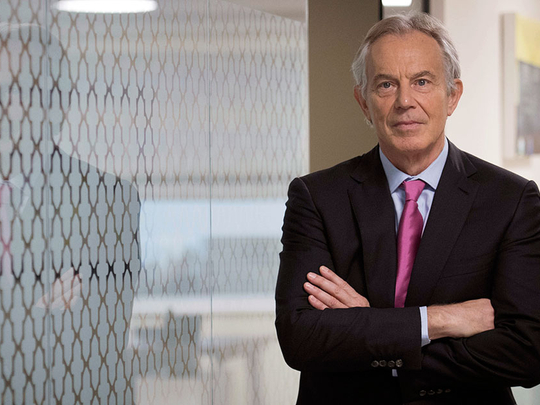
London: Twenty years after Northern Ireland’s landmark peace agreement, former British premier Tony Blair has recalled how close talks came to collapse — and warned it risks being undermined by Brexit.
“I did not know if we were going to get an agreement until literally minutes before it happened,” Blair said, ahead of a visit to Belfast to mark Tuesday’s anniversary of the 1998 Good Friday accords.
Blair remembers then US special envoy George Mitchell telling him it was “not going to work” when they entered the final round of talks involving the British and Irish governments and main Northern Irish parties.
The deal came off in the end, putting an official stop to three decades of violence that killed some 3,500 people.
However, Blair warned the deal is now complicated by Britain’s decision to leave the European Union, which risks reintroducing border checks between Northern Ireland and Ireland.
Britain and Ireland joined the bloc together in 1973 and are currently both members of the single market and customs union, which means there is no need for checks on travellers or goods.
Brexit “changes what has otherwise been the symmetry of relations between Ireland, the UK and Europe — that is now broken if Brexit goes ahead”, Blair told journalists in London.
He held back from warning of new violence, but cautioned: “Peace has to be worked on continually, so you should never think of it as guaranteed.
“The Good Friday Agreement will have to survive Brexit, and should survive Brexit, but it’s a complication.”
The agreement was signed on April 10, 1998, which was Good Friday.
Blair will mark the anniversary alongside key players including Mitchell, former US president Bill Clinton, and former Irish and Northern Irish leaders Bertie Ahern, Gerry Adams, David Trimble and Peter Robinson.
Clinton and Blair are due to attend an event at Queen’s University Belfast with other architects of the Good Friday Agreement, including former US Sen. George Mitchell and Ireland’s former prime minister, Bertie Ahern.
The deal, signed on April 10, 1998, largely ended three decades of sectarian violence in which more than 3,000 people died. Over the following years the Irish Republican Army and other paramilitary groups renounced violence and destroyed their stockpiles of weapons, and the British military dismantled its bases and checkpoints in Northern Ireland.
But two decades on, one of the peace deal’s main achievements — a Protestant-Catholic power-sharing government for Northern Ireland — is in limbo. The administration collapsed in January 2017 and attempts to restore it have faltered over the issue of protections for the Irish language — a sign of the cultural and political issues that still separate Northern Ireland’s British unionists and Irish nationalists.
Britain’s impending departure from the European Union threatens another product of the peace process, the all-out invisible border between Northern Ireland and the Republic of Ireland.
After Brexit next year, it will be the only land frontier between the United Kingdom and the EU. Both sides say there should be no return to customs posts or other border infrastructure, but it is unclear how that will be achieved.
Blair says he believes the peace deal “can and it should survive Brexit, but you can’t deny that there is now a problem.”
He said that over the last 20 years the border had become “of no great practical meaning to people in the north or the south ... Now there is going to be a practical border so of course it’s a complication.”
“Peace has to be worked on continuously. It is not guaranteed,” Blair told reporters on Monday. “Brexit is complicating things, but the Good Friday Agreement has to survive Brexit.”
“If we hadn’t gone for a power-sharing process we just wouldn’t have had a peace,” Blair insisted, adding: “These things always take time.”
The former Labour leader, who was in office from 1997 to 2007, strongly opposes Brexit and backs a new referendum on the terms of the final withdrawal deal struck with Brussels.
He believes many Brexit supporters underestimated “practical issues ... of which the most acute is Northern Ireland”.
Ireland, the EU and Britain all oppose a so-called “hard border”, but with Britain planning to leave the single market and customs union, it is not clear how this can be avoided.
Blair warned: “You are not going to make it disappear. I don’t think there is a way apart from staying in the single market and customs union.”












